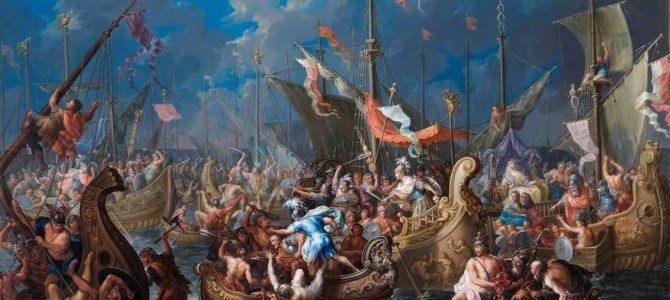
“Well, doctor, what have we got? A republic or a monarchy?”
“A republic, madam – if you can keep it.”
This well-known exchange between Benjamin Franklin and Mrs. Eliza Powel has gotten quite a bit of attention recently, circulating on social media and in the news. Americans have become increasingly aware of the fragility of our republic—how vulnerable it is to ignorance, fear, and violence. Franklin’s words from more than 200 years ago speak poignantly to the political upheaval we find ourselves in today.
The good doctor’s insight, though true, was not original. It was a sentiment many shared throughout history, including the founders of our republic and the framers of our Constitution. All of the men who helped to shape the American order well understood how susceptible their chosen system was to corruption and decay, and they understood this because they were students of ancient history.
The same, unfortunately, cannot be said of many of today’s leaders. Classics, having lost its erstwhile position of importance in pre-college curricula, has been relegated to the ivory tower of academia (when it is lucky enough to survive the knife of philistine administrators). Yet a cursory scroll through one’s newsfeed is sufficient proof that events from two millennia ago, just as those from two centuries ago, still have much insight to offer us. One such event is the Battle of Actium, which took place on September 2, 31 B.C.
The Battle’s Setting: Civil War
That early September battle, fought in the Ionian Sea off of Epirus in Greece, marked the final gasp of the Roman Republic. Although the republican form of government had been in crisis for decades, this clash between Mark Antony and Octavian, Julius Caesar’s great-nephew and adopted son, laid it fully and finally to rest.
Throughout the century, Rome had been ravaged by civil war due to economic unrest and the rise of strong-man generals in control of formidable private armies. Matters came to a head in the aftermath of the assassination of Julius Caesar in 44 B.C. Antony and Octavian worked as partners in the so-called Second Triumvirate, waging war against Caesar’s assassins Brutus and Cassius, defeating them decisively at the Battle of Philippi in Macedonia in 42 B.C.
But by 33 B.C., as eminent historian H.H. Scullard recounts in “From the Gracchi to Nero,” the Second Triumvirate had run its course, and Mark Antony and Octavian were in open conflict, with Antony allied with his lover Cleopatra, the Queen of Egypt. In 32 B.C., as both consuls for the year, along with more than 300 senators, joined Antony’s forces, and the conflict reached a boiling point in 31, when the forces of Antony and of Octavian, now consul himself, met in Greece.
On the way, Octavian’s naval commander and right-hand-man Agrippa captured several important cities, including Corinth, which isolated Antony and his men in Epirus. So, with a land action no longer feasible, Antony took Cleopatra’s advice and instead engaged Octavian on the sea on September 2.
But things went badly, and Antony joined Cleopatra’s ships in an attempt to escape. Neither his fleet nor his land army, however, were as fortunate: Antony’s men were captured or surrendered, and Antony and Cleopatra returned to Egypt and eventually committed suicide. When the dust settled, Octavian was left in sole control of all of Rome’s domains. The form of government known as the principate was inaugurated, and Octavian became the emperor, later styling himself Imperator Caesar Divi Filius Augustus (“Emperor Caesar Augustus, Son of the God”). Never again would Rome be a republic.
The Vulnerability of a Republic
Scullard summarizes the events of September 2 thus: “The century of civil wars that had started with the murder of Tiberius Gracchus was ended. The Republic and liberty had gone; men turned gratefully to their new savior.” It’s view Vergil seemingly endorsed in his depiction of the battle on the Shield of Aeneas in Book 8 of the “Aeneid,” though Vergil’s portrayal of Octavian is not without some ambiguity.
The anniversary of the Battle of Actium gives one pause to reflect on the vulnerability of a republic, so some general lessons for our own day might be drawn from the course of events in ancient Rome. First, republican constitutions are delicate and frangible things. Whatever the designs of their creators (and the Roman constitution was the product of several centuries of development), there is nothing inherently durable about them.
Second, and relatedly, even a good constitution cannot survive without virtuous character and prudence in those responsible for its administration. Third, social and economic conflict exert a massive centrifugal force away from the rule of law. Fourth, the rule of law in such cases inevitably will be replaced by the rule of men—often those with the most money and the capability of appealing to widespread fears and grievances, both legitimate and illegitimate.
Fifth, the command of such strong men, as they play upon the passions of the masses, is not only different from but antithetical to republican constitutional order. As the rise of Augustus, at the bitter end of civic division and lawlessness, indicates, the exaltation of the former means the destruction of the latter. Sixth, and finally, once such constitutional rule is lost, it is almost never recovered.









